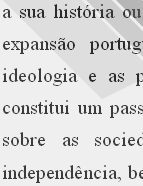

................................
In this mythology, the colonial wars were thus the unavoidable confirmation of the savagery of the Africans, who were faced by the Portuguese heroes with "serenity, haughtiness and confidence" (Lavradio, 1936, in Alexandre, Origens do colonialismo português...[Origins of Portuguese colonialism...], 1979, 10) revealing "the immortal work of [Portugal's]colonising genius" (Galvão, "O passado e o presente da colónia (de Angola)" [“The past and present of the colony (of Angola)”], Boletim Geral das Colónias [General Bulletin of the Colonies], s.l. [no location provided], no. 126, 1935, 7).
These four 'historical truths' intervened in a constant and structuring manner in the construction of the historiographical discourse. The fourth best explained Portuguese choices, since it contained the most significant elements of the Portuguese vision and sought to apprehend the norms underlying the management of the relational fabric and to define the extent of the relations between the Portuguese and the Africans. While the theories of Lusotropicalism came to play a fundamental role in the theoretical justification of the Portuguese colonial vocation in the mid-twentieth century, the idea of historical continuity was rebuilt around the impossibility of a history with rifts, since it resulted from this vocation of the Portuguese people, in other words, from a national sentiment which escaped the domain of historical contingency (Caetano, Tradições, Princípios e Métodos... [Traditions, Principles and Methods…], 1951, 26; Leal, O Colonialismo dos Anticolonialistas, 1961, 42-43).
Falsifying history: The example of Angola
The historiography of Angola, the colony that represented the most 'Lusitanian' model of the Portuguese empire, could only follow the perspectives defined in the historiographical framework established for 'Portuguese Africa'. None of the elements of civilisational affirmation - states, socioeconomic systems, religious forms, borders and spatial planning, relational strategies, cultural dynamics - could be African; therefore, only the settlement of the Portuguese allowed access to history, to knowledge, to the values of civilisation, to the manifestations of progress.
